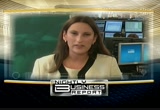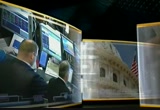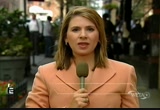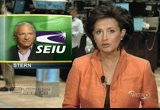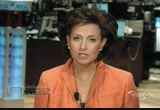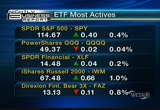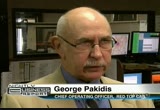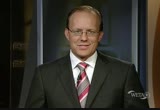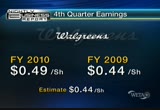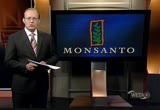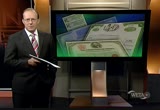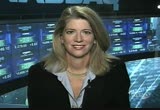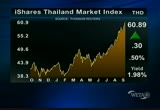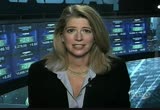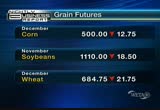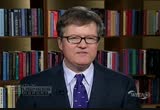tv Nightly Business Report PBS September 29, 2010 1:30am-2:00am EDT
1:34 am
double its u.s. workforce this holiday season, adding 45,000 temporary workers. the toy seller has already announced plans for 600 temporary toys 'r us express shops. the associated press is reporting the f.b.i. and the labor department are investigating the former head of the service employees international union for possible corruption. at issue: andy stern's approval of a california union leader's
1:35 am
salary. stern resigned from the union abruptly in april. >> tom: still ahead, tonight's word on the street is "frontier." find out why that could be the place for global investors with an appetite for risk. >> susie: $1,300 and then some-- that's where gold prices closed today. gold rallied for the fifth straight day to a new high of $1,308. the precious metal is up 32% in the past year as investors seek safety. long-time metals traders like m.f. global's kevin grady think the buying binge will continue. >> well, i think we definitely hit $1,400 by christmas and possibly $1,500. i think, you know, what you need to look at is, who is going to step up and sell it? the bottom line is that it's very hard for these miners to get the gold out of the ground. >> susie: grady thinks demand for gold and gold investments will continue until the u.s. recovery gets back on track and
1:36 am
the housing market perks up. >> tom: amtrak has big plans for the future-- $117 billion worth of plans. the passenger rail carrier today proposed a new high speed track between boston to washington, d.c., that can handle trains going more than 200 miles per hour. the project would require a new set of tracks and could carry more than 33 million passengers a year, almost triple the number of riders who now use that corridor. amtrak says a combination of public and private money would be needed to roll out the service, but so far there's no plan to raise the money.
1:37 am
>> susie: this is a story we found on the way to another story. it's about a start-up company, an iphone app and a new way of getting things done. maybe you've found it in your travels. stephanie dhue explains. >> reporter: taximagic is changing the way people call for cabs. with a smart phone, you can type in where you are and get a message back that the cab's on its way and track its arrival. >> we got a message the taxi's been dispatched. it's floyd norman, and he's 1.5 miles away, and i say, "cool." >> reporter: sanders partee helped start the company three years ago with one customer, red top cab in northern virginia. its c.o.o., george pakidis, says its a hit. already one out of ten of his customers book rides that way. >> the idea that a client can reach us through the web, they can call us from their smart phone, they can text us, it's
1:38 am
just user friendly. >> reporter: taximagic software can help take the load off a cab company's dispatch system. >> if you can see on the phone where the cab is on it's way to pick you up, you're less likely to call the operator and say, "dude, where's my car?" >> reporter: taximagic began with a business plan to integrate taxi charges into expense account software. but when it launched the taximagic smart phone app, things really took off. the service is now available in 30 metro areas, including san francisco, chicago and los angeles. >> i don't think we would be here if there wasn't such a thing as the iphone. our business was nice of the blackberry and nice on the web, but when the iphone came out was when everything went crazy. >> reporter: and just as everything was getting going, the financial crisis hit. but with backing from expense account software firm concur and other investors, taximagic weathered the storm. >> it was super tough.
1:39 am
we had our second round of investment lined up over the summer of '08, and when the financial crisis hit, it went away. and so, instead of doing a smooth growth transition, we went through six months of scrambling to get our next funding lined up. >> reporter: taximagic makes money from a fee for each ride a cab company gets through the application. >> this year, we've just booked our one-millionth ride for the year. our goal is by next year to do a million rides in a month. >> reporter: the app isn't the only thing the company has going for it. it's also rolling out a new payment service for cabs, letting riders swipe their own credit cards. the system will eventually show videos, which could open up even more avenues for growth. stephanie dhue, "nightly business report," washington. >> tom: the major indices spent much of the day unchanged.
1:40 am
here's tonight's "market focus." the data on home prices climbing was offset by the lowest consumer confidence since february. >> tom: no talk about the possibility of a replacement for ousted c.e.o. mark herd. instead, the talk was about better than expectlied guidance. here is the 12-month chart. it was clearly up fractionally during the regular session, and 2% from these levels after hours. no indication of any replacement for ousted c.e.o. herd. walgreens, the biggest percentage gainer in the s&p 500, the market greeted its latest quarterly result with pretty descent stock. key pharmacy sales grew
1:41 am
better than expected, and candy bars and shampoo were up more than 1%. w.a.g. shares jumped more than 11% on four times usual volume. in a sign of confidence, the company completed its stock buyback program more than a year ahead of schedule. today's rally takes walgreen to a four-month high. competitor cvs saw some buying too, up almost 3%. but cvs remains below its july high. both cvs and walgreen, along with johnson and johnson, were told by the f.d.a. to stop claiming their mouth washes remove certain kinds of plaque and suggest benefits that have not been proven. health care was the leading sector today, driven by medical device makers. boston scientific led the pack, rallying almost 8% on heavy volume. shares are above $6 for the first time since july. zimmer holdings added 3% on stronger than average volume. and stryker is at a two-month high today, up 2%. monsanto was the biggest drag on the s&p 500, with worries growing that sales of one of its
1:42 am
newest seeds aren't. shares fell more the 8% on seven times its usual volume. this is a two-and-a-half month low for the stock. its newer genetically modified corn seed isn't yielding as much corn as older versions, according to an analyst at jefferies. the company says it's still very early in the harvest season. big merger announcements took the day off, but watch the possible deal in rental cars. dollar thrifty shareholders are scheduled to vote thursday on an offer from hertz to buy the company. dollar actually has two offers on the table. the hertz deal values dollar thrifty at $50.88 based on tonight's closing prices. avis-budget is offering the equivalent of $53.20 per share. each of them is a mix of cash and stock. dollar thrifty stock is trading below both offers as the market is uncertain about a deal getting down. a big dollar thrifty shareholder with more than 7% of the stock says he will vote against the lower priced hertz offer this week. earlier in the program we mentioned the new high for gold today.
1:43 am
it wasn't the only safe haven that was attracting buyers. bond buyers drove down the yield on the benchmark ten-year government bond to 2.47%, its lowest since january of 2009. and that's tonight's "market focus." test. >> tom: this may be the best september for u.s. stocks in more than two generations. it has been even more profitable for investors in emerging markets. tonight's word on the street is "frontier."
1:44 am
debra reports for thestreet.com, and she joins us from the nasdaq. welcome to "nightly business report." nice to see you. >> thanks for having me. >> tom: so many investors are familiar with the emerging markets. ities the difference between a frontier market? >> the frontier market tends to have a little lower market cap, and maybe less liquidity to developing markets. with the frontier markets, you kind of think of them as the india and china of 20 years ago. >> tom: maybe more risk, but potentially more reward, and clearly that has been the case over the last 12 months. we'll start with the ishares, up 39% in the last 12 months. what has made this one so special. >> what is going on is turkey. turkey had 10% growth and its second quarter, and we would love to have that in our own country. and competence is at a two-year high, and people are buying things, buying cars and making lots of purchases. that has boosted lots of companies in that country. >> tom: it is a strong
1:45 am
domestic economy that is fueling that one. e.t.f., t.h.d., the sticker symbol on this one, 40% for shareholders in the past 12 months. phenomenal performance in what has been a pretty difficult market. >> it has been a difficult market for them because in the spring, they had a lot of antigovernment protests. the government squashed that, by foreign investors sold a record $1.8 billion. and in one week in september, they bought $280 million worth of thai stock. it is weak, but it is coming back. >> tom: and foreign investment dollars clearly chasing performance to some degree in thailand. >> that's correct. >> tom: the e.t.f., i.d. x., the ticker symbol, a quarter of the fund is in finance, and 15% in materials. what is it to like about indonesia. >> reporter: the index
1:46 am
is up 90%. japan and south korea are expanding their operations, and south korea sees indonesia as the place to go, and so they're going there, and that is fueling huge growth. >> tom: clearly these three exchange traded funds have provided a lot of rewards for people who have been in here early. but what is the risk in trying one type of frontier or even an emerging market? >> in emerging markets, you only want about 5%. and that will offset some of the poor performance with the american markets. if you put 5%, and it returns, you've done well. >> tom: you can read debra's article at thestreet.com, and there is a link to it on our website as well. thanks so much, debra borchart, she is a reporter with thestreet.com.
1:47 am
>> susie: the crack of the bat, the roar of the crowd, the smell of the popcorn-- baseball is america's favorite pastime. but now it has run into the roadblock of the economic meltdown, and baseball is being battered. filmmaker ken burns examines the state of the sport in his latest documentary, "the tenth inning," which begins tonight on pbs. so tonight we begin a two-part series looking at the business of baseball. reporter jeff yastine looks at the economics of a sport that is striking out with fans more and more these days. >> reporter: the players are on the field, but the fans aren't at the stadium. they're here in a sports bar. with a struggling recovery and tapped out consumers, it's more likely you'll find fans taking a seat here or watching the game at home rather than at the ballpark. >> it's too expensive to go to the games. parking is how much? and then i don't feel like paying $12 for a hotdog, basically. >> it's not an every day, every week, or every month occurrence for many people that i know.
1:48 am
>> reporter: baseball's had its ups and downs attendance-wise. in the first years of the great depression, the number of fans at games fell by nearly half. during the recent great recession, baseball attendance is also down. it's off about 8% over the last three years. the question is, will fans return when the economy improves? most experts who follow the business of baseball say yes. standard and poor's john bilardello says the credit- worthiness of major league baseball is investment grade. >> baseball's had a very long history of success, well over 100 years. and during both up economic environments and down economic environments, the success of the business has been very good. where league-wide revenues have gone up fairly consistently, certainly player compensation has gone up, and team values have gone up. >> reporter: also up: the cost of attending a ballgame.
1:49 am
in 1991, tickets, food and drink, parking, a couple of souvenir programs and team caps for a family of four would run you $76. last year, it had jumped to $196, up nearly 150%. considering average hourly wages have risen by about half that over the same period, it raises a question: has baseball finally "hit the wall" when it comes to the affordability of games? apparently the answer is yes, because when this year's season started, a funny thing happened. five of major league baseball's 30 teams actually dropped their ticket prices. and in many venues, the cost of food, even parking, declined as well. overall, the average cost of attending a ballgame fell by about $2. jim riordan, sports business professor at florida atlantic university, says teams are smarter about the marketplace, using features like "dynamic pricing." think of ticket prices that fluctuate based on demand, just
1:50 am
like stock prices. >> the very same seat the next day that might have gone for $150 can be reduced to $75 or even $30, depending on who's playing. dynamic pricing takes in a lot of variables, not only including the statistics of the current teams, but the weather, the time of year, where the teams are in the standings, the day of the week. >> reporter: ultimately, say sports business veterans like rick horrow, the recession is just another bump in the road for the business of baseball. >> when you were just a pup cub reporter 30 years ago, we heard the same questions-- salaries out of whack, ticket prices out of whack, "we're facing economic armageddon." it's one of those questions that the market ultimately will decide. baseball seems to get back to the level it needs to. we've got a lot of criticisms, a lot of problems with the business of baseball, but it always seems to reboun >> reporter: jeff yastine, "nightly business report,"
1:51 am
miami. >> susie: tomorrow, does it pay to lose in major league baseball? jeff looks at the unintended consequences of leveling baseball's financial playing field. >> tom: also tomorrow, we'll be focused on federal reserve policy. we'll have an exclusive one on one with eric rosengren, president and c.e.o. of the federal reserve bank of boston. he's a voting member of the fed's interest rate committee. we'll ask him what the central bank plans to do next to boost the economy. we'll also talk inflation, jobs and interest rates. >> susie: uncle sam says women managers still make less than their male counterparts. the government accountability office today issued its report on women in management. the study shows female leaders make 81 cents for every dollar their male co-workers make. the gap has narrowed slightly, but congresswoman carolyn maloney says not enough. >> the pay gap for women in
1:52 am
management shrank by just two cents from 2000 to 2007. in short and in no uncertain terms, we are stalled out. >> susie: maloney's comments came at a joint economic committee hearing on capitol hill. the report also looked at the number of women in management positions and the affect of motherhood on careers.
1:53 am
there's a huge debate about extending the bush tax cuts, and one key is whether you make more or less than $250,000. well, tonight's commentator introduces us to the henrys, a hypothetical family living and paying taxes on that $250,000. here's justin fox, editorial director of the "harvard business review." >> we've been hearing a lot lately about americans who make $250,000 a year. we'll be hearing more. that's because these lucky people are on the dividing line between the republicans and the democrats on taxes. republicans want to extend all the bush-era tax cuts. democrats want to extend them, too, but only for households making less than 250,000. as a dividing line between the middle class and the rich, $250,000 a year isn't crazy.
1:54 am
only 2% of american households make more than that. still, many of those in the income range from $250,000 to about $500,000 a year don't feel wealthy. they've got big student loans, big mortgages, and not much in the way of assets. shawn tully at "fortune" magazine has dubbed them "henrys"-- for "high earners, not rich yet"-- and many feel victimized by the democrats' tax plans. the henrys pay substantially higher taxes than those below them on the income scale. that should be no surprise. it's the american way, and has been at least since the creation of the federal income tax almost a century ago. but something strange happens to taxes in the united states as annual income rises above $500,000. rates start dropping. people who make $1 million a year or $2 million, or $200 million, generally pay taxes at a lower rate than those making $250,000 to $500,000. it's the henrys who face the country's heaviest tax burden.
1:55 am
none of this means we should pity people making $250,000 a year. it does mean they're not totally out of line in whining about their taxes. i'm justin fox. >> susie: that's "nightly business report" for tuesday, september 28. i'm susie gharib. good night, everyone. and good night to you, too, tom. >> tom: good night, susie. i'm tom hudson. good night, everyone. we hope to see all of you again tomorrow night. "nightly business report" is made possible by: this program was made possible by contributions to your pbs station from viewers like you. thank you. captioning sponsored by wpbt captioned by media access group at wgbh access.wgbh.org 0,x,2,x,x,x,1,1,1,8,g/g/3,7,1,b/
1:59 am
504 Views
IN COLLECTIONS
WETA (PBS) Television Archive
Television Archive  Television Archive News Search Service
Television Archive News Search Service 
Uploaded by TV Archive on

 Live Music Archive
Live Music Archive Librivox Free Audio
Librivox Free Audio Metropolitan Museum
Metropolitan Museum Cleveland Museum of Art
Cleveland Museum of Art Internet Arcade
Internet Arcade Console Living Room
Console Living Room Books to Borrow
Books to Borrow Open Library
Open Library TV News
TV News Understanding 9/11
Understanding 9/11